alisha, 17, a level english lit, biology, chemistry and psychology
Don't wanna be here? Send us removal request.
Text
A few more things to try:
No money challenge: Find places in your city that are completely free to go to and spend a day exploring them.
Cheap adventure challenge: Now you can find places that are cheap to go to and spend a day doing those things. Give yourself a budget for the day and stick to it.
Photography challenge: Find unique places to take photos for your Instagram! (Graffiti, gardens, coffee shops, Urban scapes etc)
Social Media: Scroll through your accounts and find your aesthetic. Clean up your feed and put a little bit of planning into the future of your posts.
Thrift Shop Clothing Haul: Go to a Goodwill or a Value Village etc and look for aesthetic items. Put together an outfit from there.
Road trip Challenge: Hop in a car with friends and drive somewhere new to all of you. Look for fun things to do and cool places to eat.
Exploring your city: Explore parts of your city that you’ve never been to before!
Find a “spot” for you and your friends to chill, whether it’s a bar that you can always go to, a restaurant, cafe, diner etc. Experience being a ‘regular’ for a while.
Join a club related to your interests whether that’s theater, music, art, photography, fitness or even reading and writing.
Do a cooking class or pottery lessons.
Broke? That’s okay. Turn your home into a hangout place. Think of interesting things to do at home.(Set up a projector and watch movies outside, music and pizza by the pool, board games etc)
Don’t be too caught up in looking cool, ‘uncool’ things are hella fun too. Don’t let people judge you for having fun.
Learn to do something new with physically. (Running, Yoga, the splits, twerking, dancing etc)
Redecorate your room. The catch? Don’t simply buy everything for your room, make them. There are millions of DIY videos out there for amazing room ideas.
Make Pinterest boards for everything you want in your life.(Fitness, Health, Food, Decor, Studyspo,Travel, Recreation etc) Use it as motivation to keep trying to reach that goal.
Make new friends at work, school, online etc.
245 notes
·
View notes
Text
How to fill notebooks! 🌟
Keep a dream journal
Use a notebook to record any advice you are given or give
For music lovers! Write a song then how you felt when you heard it for the first time, what it reminds you of, what was your life like at that time
Keep a journal for all happy memories
A gratitude journal, write each day a list of what you are grateful for
Copy out poems you find and like or song lyrics
Use one for an ongoing to do list, just cross each thing off as you complete it. You’ll never lose a list again!
A recipe book- copy out recipes to try or ones you have tried. Leave some space to review one once you try it and say what you would change
Keep a notebook for all your creative ideas and projects. Words you like, story ideas, painting ideas, whatever you are interested in
A travel diary- every time you go somewhere write where you went and what you liked about it, the people you met
Everytime you watch a new film review it! Write movies it’s similar to, what did you like. Summarise the plot. Make it as funny or serious as you like
A stream of consciousness- before bed write everything you are thinking with no filtering. I havent tried this but I saw it recommended quite a bit??
Write down your goals. Short term and long term. As small as getting an A in your law assessment or as big as publishing a book. This will keep you on track and motivated.
The law of attraction, use a notebook to manifest. Write what you want to happen. Visualise it happening, keep track of what has manifested.
Will add if I think of more!
3K notes
·
View notes
Text
How can I study without sacrifice and blood?
Yes, we’ve all been there, where we thought maybe sacrificing some blood to the deities will help me pass this grade?. Fear not, for there is a cure for your problem!
1) When you’re lucky and you got time
Lets say, you have three months to prepare yourself to face the wrath of finals, here’s what you should do:
Month One : Make notes
Scan the textbooks for any potential information which you think is important, take help from teachers or friends if you need to.
They do help. you can utilize multiple resources for ready made notes as well.
For the whole month, make as many notes as you can - ensuring that you have covered every tiny spec of information in.
Organize all papers and notes (including digital ones - also include ones you took in class even though they’re mere scribbles) neatly as you approach month two.
Month Two : Learning
Now this is the most difficult part - actual studying.
Refer to your notes thousands of times, rewrite them and revise them however you want to.
This is also the time when you use those highlighters you brought on impulse, just know how to do it correctly.
Read your textbooks thoroughly, chapter by chapter - better yet paragraphs by paragraphs.
Write down keywords on flashcards (i recommend Quizlet) even though hey are not vocabulary related, just don’t forget these terms!
Make cheat sheets as if you will be using them for finals, cram in as much information as you can.
Revise notes, memorize those sentences which are italicized or highlighted in bold in your textbook by heart.
Rote learning isn’t the best option, but when you’re desperate you gotta rely on that.
Take this time to solve all doubts either with teachers or by using he internet - like, have you used khan academy?
By the end of this month you must have thorough knowledge about your syllabus in detail.
Month Three : Practice
Now that you are ready with the basic idea of what your textbook is all about, it’s time to put that knowledge into use.
Start solving practice papers, worksheets or any other test material you can grab onto.
There are certain books specially printed for providing potential question papers for an exam, invest in them you won’t regret it.
You can ask your teacher for some important questions, and if you have been a good student so far she’ll gladly help.
Once you know you have solved about millions of papers, make your own question papers.
Try to figure out what is important from a teacher’s point of view, and learn accordingly.
Voila - now you are 100% prepared for finals, walk into the exam hall like a boss and leave like a boss!
2) When you fall short on time and finals are freaking close!
Okay, so you didn’t utilize those three months efficiently and now you are in deep shit, do not panic because you still can manage to do it.
Make a study schedule - a realistic one which you are pretty sure you will follow.
Go to your phone - settings - turn off notifications, trust me you will love me for suggesting that later.
Be prepared for all-nighters, gather snacks ( I don’t care if they are healthy or not - you can’t be perfect all the time), all study material and all resources.
Make the library your home for the time being.
You’re lucky if you got social skills, take help from that smart friend you managed to make six months ago.
If you are a bit shy (like yours truly), remember - teachers are your best friends!
Now you don’t have time to make notes, so use whatever you have at hand.
Start solving papers and as you go with the test clear your doubts simultaneously.
It helps to have a guide around when you re solving papers, they will help you out instantly.
Classify your textbook into two sections : damn important and semi important, go through that damn important parts first and when you are confident you can handle them move onto the semi important portion.
Make the most of each day, which means bidding farewell to Netflix and comfortable blankets and the sweet, sweet sleep, but make sure you make up for all the sleep in the form of short naps.
Even then if you can’t, skip some parts - what you can certainly not understand despite efforts, let it go.
Now you are prepared for finals, hopefully without tears and blood.
3) Some more advice.
Because it helped me.
If you have a bullet journal, try to maintain a study journal - note the amount of hours you study per session, the subject and topic you covered and whether you completely understood it or not.
If you cannot maintain the aesthetics, don’t - just write what you understand.
Teaching the material to your pet or a doll or a teddy bear helps a lot.
Speaking out loud when studying will help better memorization.
Take help from your mom (or anybody who stays with you 24 x 7 at home) when making your study schedule - she will point out the times which you can use productively better than you.
Stop looking for ‘How to study efficiently’ guides on the internet, because you won’t realize when you wasted three hours trying to learn the basics of studying.
For motivation, come straight to Tumblr because this site is a storehouse of studyinspo, follow (I’m sure you already do) some cool studyblrs like @studyign
@grangergrades
@tbhstudying
@studyquill
@emmastudies
@elkstudies
And so many more which I can’t think of at the moment, they are all very sweet and will help if you reach out.
I hope this guide helped, please reblog to save a student and feel free to ask me for more tips!
1K notes
·
View notes
Text
this is for the girls who fight their anxiety to get their dream grades
this is for the girls with depression but are still determinated to kick ass
this is for the girls who feel lonely staying home studying on a friday night
i love you and i am rooting for you
103K notes
·
View notes
Photo
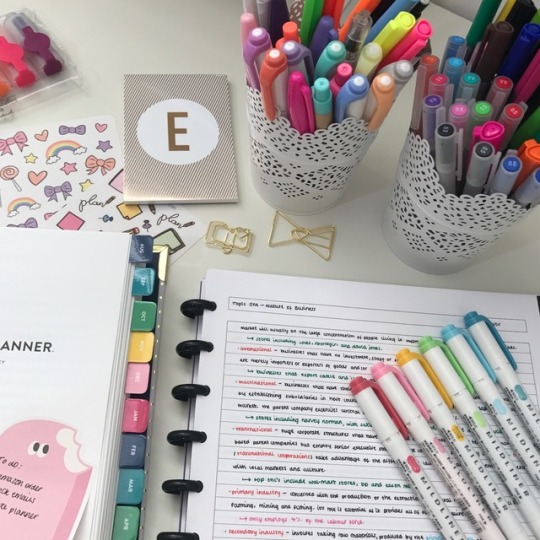
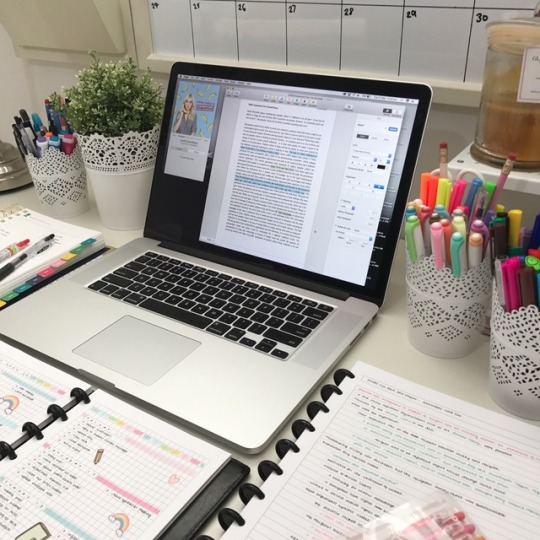
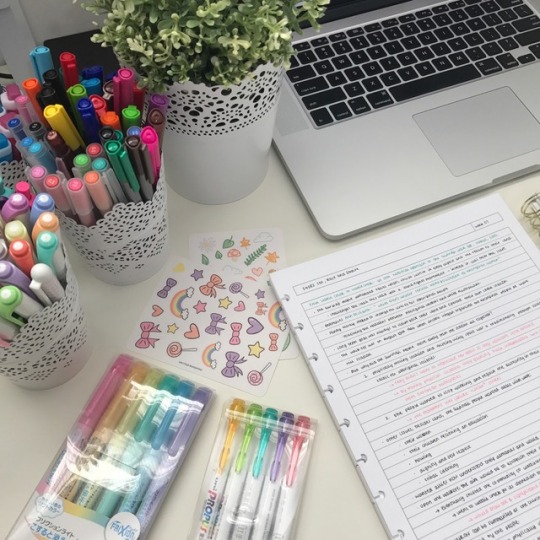
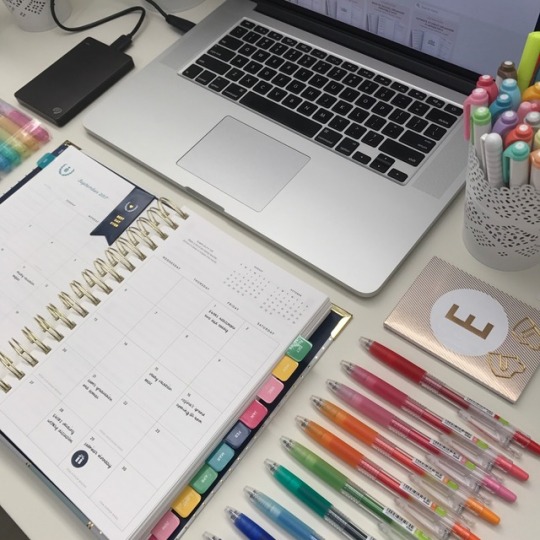
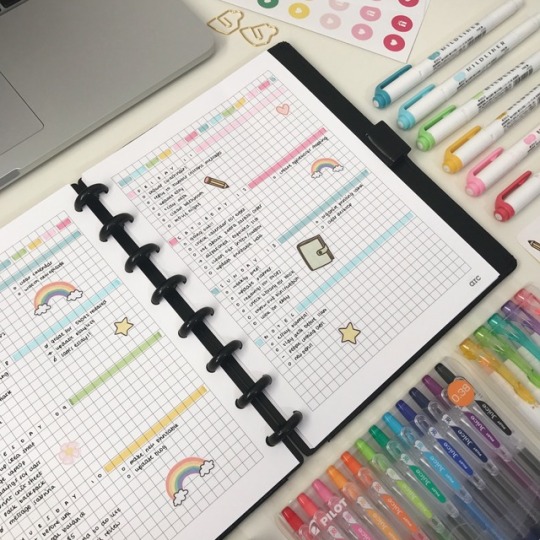
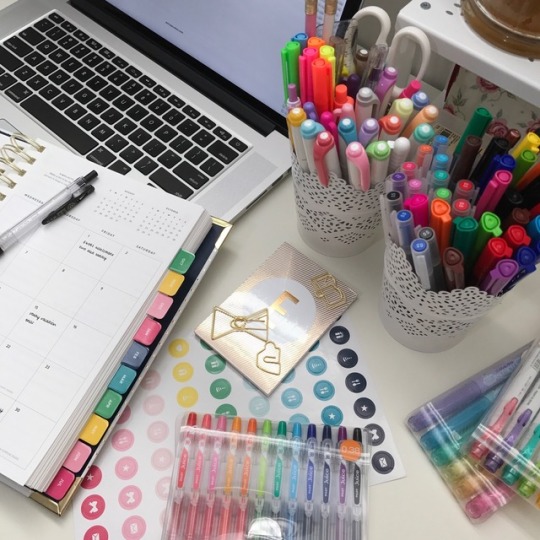
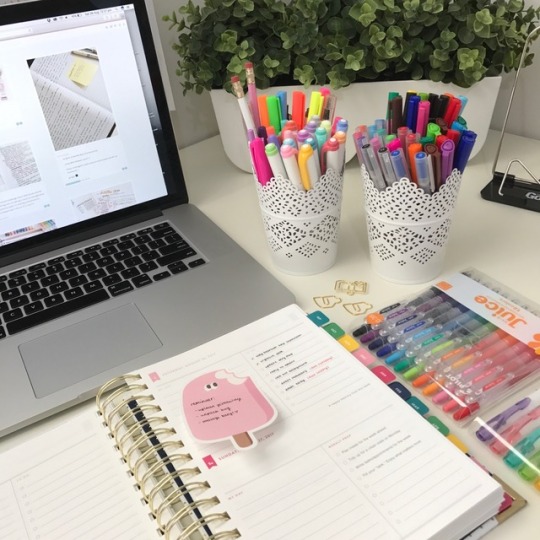
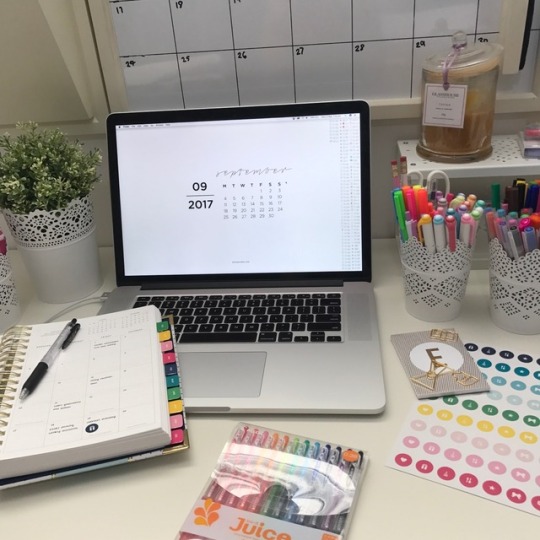
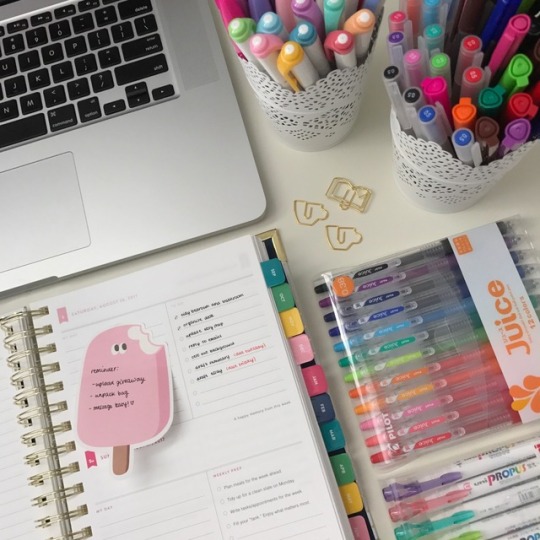
lowkey obsessing over coloured stationery at the moment (if you couldn’t tell…)
9K notes
·
View notes
Text
types of study breaks for every situation
if you realize you’ve been studying for hours: grab a snack to refuel your body and watch a sitcom to refuel your brain. then back to the books.
if you’re feeling stressed out: take some deep breaths, text your friends, maybe stare at a wall for a few minutes. gather yourself.
if you can’t seem to focus: get moving and get outside. take out the garbage, check your mail box, maybe walk your dog. just get moving and get fresh air. it’ll help bring you back.
if there’s something else going on in your life and you can’t get it off your mind: write down what’s going through your head, sort of like a diary entry. it’ll help you work things out.
if you’re just mentally and physically exhausted: set a timer for 25-30 minutes and take a nap. any longer and you’ll hit REM and you’ll wake up feeling just as tired. once you wake up, get some caffeine in you.
if the material is boring as hell: find another way to study. see if there’s a crash course video online about it or draw out what you’re trying to learn in diagrams and pictures to make it fun.
if people around you won’t shut up: listen to some music. soundtrack and classical music is always good because they won’t absorb you as much as music with lyrics. white noise (like ocean waves, rain sounds, etc.) also works.
if you only half understand a concept: call/message a friend who’s not in the class and try to teach the material to them. this will help you mentally work through the material and will help you remember it as well.
93K notes
·
View notes
Text
Back to the basics: Laboratory experiments
Laboratory experiments are based on the positivist approach to studying human behaviour - they involved highly controlled environments (so any variables that may interfere with the results are controlled and the independent variable is manipulated) and use a standardised procedure.
The good things about this (yay!):
The study can be replicated: as the procedure is standardised (there is a set list of instructions for carrying at the experiment, the same measures are taken each time) this means the experiment can be repeated to test for reliability (the consistency of results).
Highly controlled conditions: this means the results are more likely to be accurate and objective, which would be valued by a positivist psychologist.
Cause and effect: relationships can be established due to the highly controlled environment - as all external variables have been controlled or eradicated, we can be sure that it is the manipulation of the independent variable that is responsible for the outcome.
The bad things about this (oww!)
A lack of population validity: as lab experiments must be highly controlled (and so in a designated area with limited space) it is less likely that the researcher will be able to get a large number of participants as this would take a much longer time. Therefore, this limits the extent to which the outcome of the experiments can be generalised to wider society as the study population is not representative of society’s population.
Low ecological validity: as the environment of a study is highly artificial and controlled, it is unlikely that participants will behave the same as they would in their natural environment. Therefore, the results may not be a realistic representation of human behaviour.
Demand characteristics: as the experiment is not conducted in the participants natural environment they will be aware of the fact they are being studied which could lead them to behave in a certain way - maybe to please the researcher, or to spite them (the screw-you effect). This is also known as the Hawthorne Effect.
Researcher bias: as the researcher has a great deal of control and influence over the study, this could influence their recall of events and possibly the behaviour of participants.

Any requests? Let me know!
47 notes
·
View notes
Photo



Hey guys, the reason I haven’t been posting much of my revision is because I have started doing it on my iPad. Anyone who is forgetful like me/always losing there revision would really benefit from this app! It’s called onenote. I am going to make a post later today to show the best way to use it
#oh boy do i love me some onenote#swear by it tbh#although i am v into google atm#like slides and docs and shit#psych
133 notes
·
View notes
Text
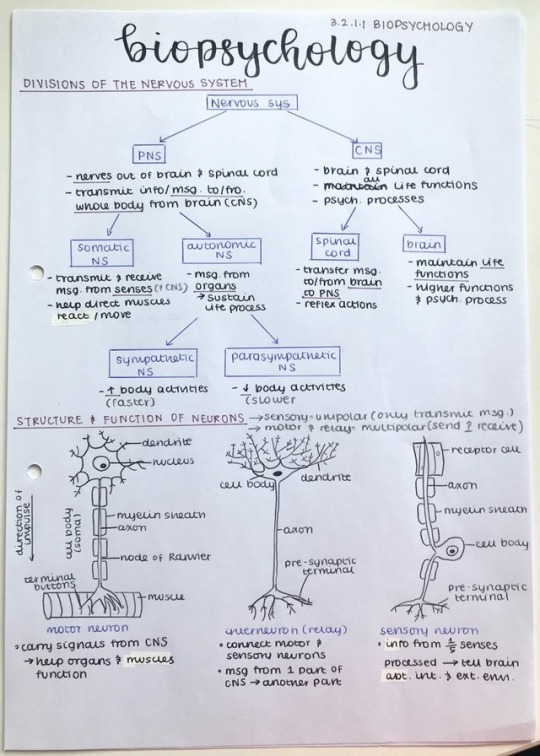
25/1/2019
A picture of some biopsych notes that I did during my free! (please excuse the horrible lighting)
-H
305 notes
·
View notes
Photo


15 - 9 - 17
very basic psychology mind map on memory in preparation for my essay on monday! ♡
66 notes
·
View notes
Text
Quick q
Would anyone be interested in summary posts for AS Biology, Chemistry, English Lit or Psych? Because I might make some as a way of revising and recapping material, but if any specific topics are wanted, I can probs do most of them!
(For English Lit it would be on the tempest, 1984, streetcar and Rossetti as that’s what I’ve studied)
#let me know :))#studyblr#tips#studying#revision#college#studygram#alevels#motivation#a level english lit#english#english lit#as english lit#ocr english#1984#orwell#rossetti#a streetcar named desire#the tempest#shakespeare#a level biology#as biology#aqa biology#a level chemistry#as chemistry#ocr chemistry#a level psychology#as psychology#aqa psychology
8 notes
·
View notes
Text
The Bobo doll experiment (A level break down)
Topic: Approaches in psychology (social learning theory)
Key researcher: Albert Bandura
Year: 1961
Study type: controlled observation
Participants: 36 boys and 36 girls aged 3-6 years.
Procedure:
(Modelling) Half of the children were shown 10 minute footage of an adult being aggressive with the bobo doll, throwing it and kicking it. The other half were shown an adult being gentle
Children were shown toys but could not play with them
Children were then taken into a room with a variety of toys including crayons, dolls, toy guns (some aggressive toys and some non aggressive ones). They were observed for 20 minutes. The extent to which they imitated models was measured.
Results:
Children who observed an aggressive model behaved more aggressively than those in the other condition
Imitation increased if the model in the video was of the same sex
Boys overall were more aggressive.
Conclusion:
This supports social learning theory. pay attention to the behaviour of adults when learning how they should behave in certain situations (the children observing the adults play with the doll). They retain this information in their memory. Then, when they are put in the same situation as the adults so that they can reproduce their behaviour, (children put in the room of toys with the bobo doll) they become motivated to do so. We are more likely to copy the behaviour of adults we identify with, so those of the same sex.

306 notes
·
View notes
Text
It’s okay to take a break sometimes. It’s okay to do nothing productive for a whole day, or even longer. Your brain needs to rest just as much as your body does. You aren’t a failure, or falling behind, or wasting time by resting. Your value isn’t based on your productivity, and you don’t have to be productive at every possible moment to be of worth.
5K notes
·
View notes
Text
how to survive bad school days, from morning till night
my last year of high school starts rather soon, and i’ve had more than my fair share of days when i wake up wanting to cry. there aren’t many things you can do when obligations like school force you to get over it as soon as it starts, so here are some tips to make your day better.
1. dress opposite the way you feel. even though sweats might be super tempting, dress up. wear your favorite pair of jeans, or a dress, or your cutest sneakers, even. wear bright colors at least. sweatpants and such will just make you feel even more blah and unfocused throughout the day.
2. moisturize! this might seem like an odd idea, but moisturizing and going into school glowy and soft definitely helps me feel more comfortable and less ugh during the school day. it helps keep me in my home-y comfort zone, if that makes sense.
3. carry something from home. this can be a book (even if you don’t read it), a tube of chapstick, a big waterbottle, etc… i have even gone as far as wrapping myself in a small blanket and walking around like that for the day. if you like this option and don’t feel comfortable wearing it, fold it up and place it in your backpack, just so you know it’s there.
4. plan out your day. even if it’s just making a mental note, tell and remind yourself of the things your going to do and when. this will get rid of any unnecessary stress and pressure. if something unexpected comes up, this will also help you manage your time a little better.
5. eat and drink happy things! pick today to pack a lunch, no matter what your usual routine is. drink plenty of water throughout this day, and eat as many fruits and veggies as you can. fill a reusable water bottle with water, fruit (like lemon or strawberries), and chia seeds! it’s perfect to sip throughout the day for a reboot or just to boost your mood.
6. when you get home, bathe immediately! wash off the day’s dirt. drop everything as soon as you get home, and either jump in the shower or relax in a bath with your favorite soaps and scents and a book. give yourself a break before you have to get back to work.
7. don’t ignore your work. by work, i mean school work. if you’re having a bad day, don’t hesitate to take a break from talking to people or running (low-priority) errands. you don’t want to ignore schoolwork, though, because teachers aren’t the most lenient people in the world, and getting it done will take a lot off of your shoulders. pushing it away will only gain you more bad days.
8. go to bed. get sleep! you want to be refreshed and happy for the next day, even if it’s a weekend. there’s a good chance your bad day began because you didn’t get enough sleep, or because you were ripped out of bed. reward yourself with rest after a long day.
18K notes
·
View notes
Photo






8K notes
·
View notes
Text

i really feel like i’m not the only one who experienced this
52K notes
·
View notes
Text
How to Handle Having TOO MUCH To Do
So let’s say you’re in the same boat I am (this is a running theme, have you noticed?) and you’ve just got, like, SO MUCH STUFF that HAS to get done YESTERDAY or you will DIE (or fail/get fired/mope). Everything needs to be done yesterday, you’re sick, and for whatever reason you are focusing on the least important stuff first. What to do!
Take a deep breath, because this is a boot camp in prioritization.
Make a 3 by 4 grid. Make it pretty big. The line above your top row goes like this: Due YESTERDAY - due TOMORROW - due LATER. Along the side, write: Takes 5 min - Takes 30 min - Takes hours - Takes DAYS.
Divide ALL your tasks into one of these squares, based on how much work you still have to do. A thank you note for a present you received two weeks ago? That takes 5 minutes and was due YESTERDAY. Put it in that square. A five page paper that’s due tomorrow? That takes an hour/hours, place it appropriately. Tomorrow’s speech you just need to rehearse? Half an hour, due TOMORROW. Do the same for ALL of your tasks
Your priority goes like this:
5 minutes due YESTERDAY
5 minutes due TOMORROW
Half-hour due YESTERDAY
Half-hour due TOMORROW
Hours due YESTERDAY
Hours due TOMORROW
5 minutes due LATER
Half-hour due LATER
Hours due LATER
DAYS due YESTERDAY
DAYS due TOMORROW
DAYS due LATER
At this point you just go down the list in each section. If something feels especially urgent, for whatever reason - a certain professor is hounding you, you’re especially worried about that speech, whatever - you can bump that up to the top of the entire list. However, going through the list like this is what I find most efficient.
Some people do like to save the 5 minute tasks for kind of a break between longer-running tasks. If that’s what you want to try, go for it! You’re the one studying here.
So that’s how to prioritize. Now, how to actually do shit? That’s where the 20/10 method comes in. It’s simple: do stuff like a stuff-doing FIEND for 20 minutes, then take a ten minute break and do whatever you want. Repeat ad infinitum. It’s how I’ve gotten through my to do list, concussed and everything.
You’ve got this. Get a drink and start - we can do our stuff together!
100K notes
·
View notes